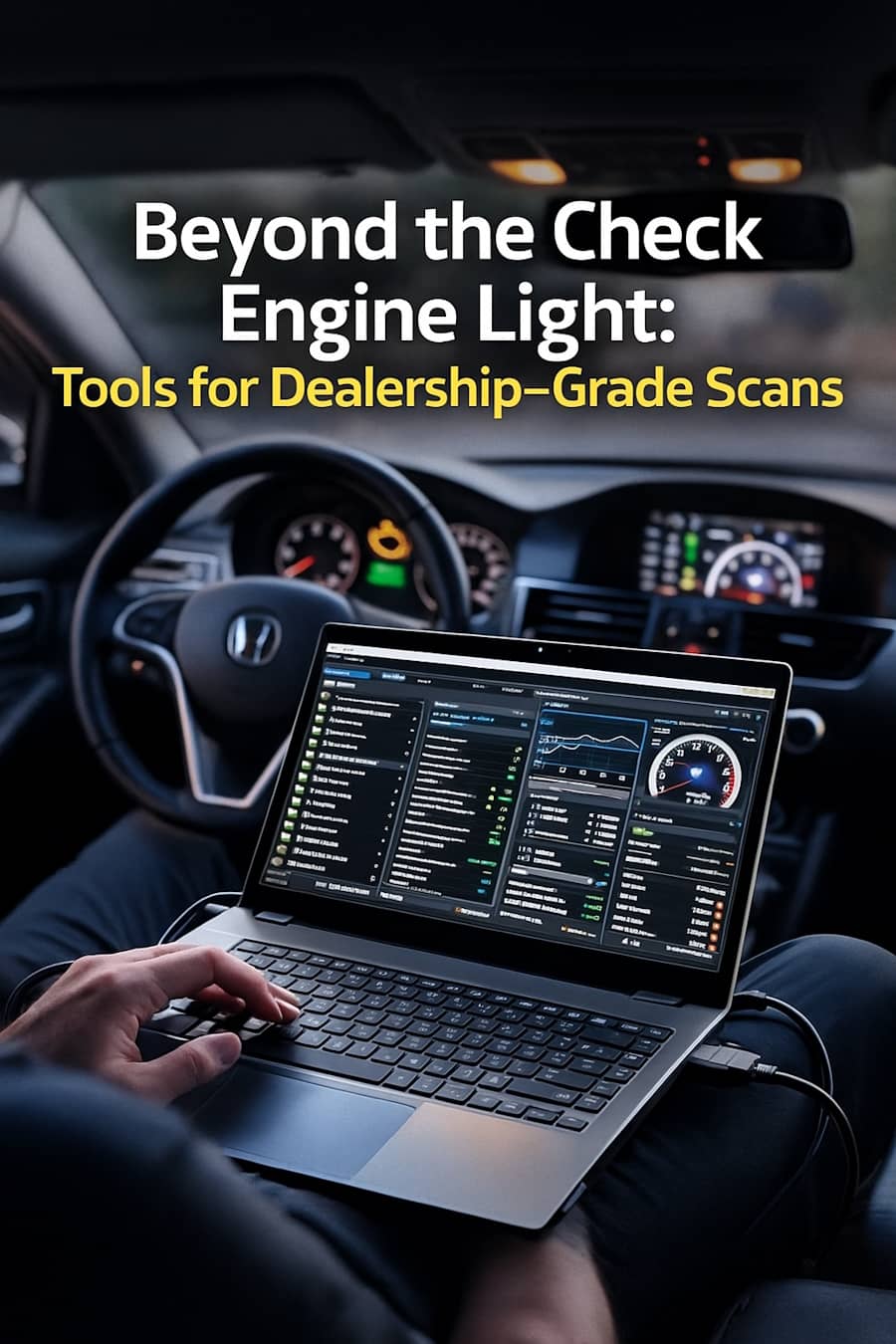It’s not unusual to feel a sense of panic when your check engine light comes on. Today’s cars are complex machines, known to many as “rolling computers,” and a mere warning light can represent numerous possible concerns in very different areas of your vehicle. Although many drivers may use a bare-bones code reader, it’s often difficult to get the whole story. And then there’s specialized car diagnostic software like FORScan for Ford, Mazda, and Lincoln vehicles that gives professional mechanics a whole new level of insight by providing access to the OBD-II equipped vehicle’s modules, beyond just reading/clearing fault codes, they can see live data or perform better diagnostics than just reinforcing a check engine light.
Thankfully, you don’t have to return to the dealership for this kind of precision. Some independent auto repair shops have already invested in these dealer-level scan tools, offering the best of both worlds: expert diagnostics and personal service. This guide will help you understand the difference in scanners, how all repair shops can protect your warranty, and what to look for in a repair shop.
Generic vs. Dealership-Level Scanners
Some diagnostic instruments are better than others. The distinction is important to make in order to receive a proper diagnosis and avoid pointless repairs.
A generic OBD-II scanner, like the type you’d purchase at an auto parts store, is crippled by comparison. It mostly only reads "generic" powertrain codes (P0xxx and P2xx), as those are pretty much what every manufacturer uses. These scanners are good for identifying generic engine problems, but they won’t be able to reach the root of what ails manufacturer-specific systems.
Dealer-level scan tools, on the contrary, offer total access to all of your vehicle's electronics systems -- including the engine and transmission as well as the airbags and advanced driver-assistance systems (ADAS). They can also read manufacturer-specific “enhanced codes” (P1 codes) and recalibrate your vehicle's entire system, often required after a repair. That’s the difference between getting a vague notion of what the problem is and receiving a precise, actionable diagnosis.
|
Feature |
Generic Scanner |
Dealership-Level Tool |
|
Code Access |
Basic Powertrain Codes |
All Modules & Manufacturer-Specific Codes |
|
System Access |
Limited |
In-Depth Access |
|
Recalibration Capabilities |
No |
Yes |
|
OEM Data Access |
No |
Yes |
|
Warranty Preservation Support |
Limited |
High |
|
Cost |
Lower |
Higher |
How Independent Shops Can Preserve Your Warranty
One myth is that you have to take your car into the dealership for absolutely everything to keep your warranty. This isn't true. Magnuson-Moss Warranty Act also says that it is your right to have the car serviced by someone other than the dealer without voiding your warranty. It is not some Blooket bot which you can pass by easily.
A reputable independent shop helps preserve your warranty by:
- Adhering to Maintenance Schedules: They follow the manufacturer’s recommended service intervals to the letter.
- Using OEM or Equivalent Parts: They use parts that meet or exceed the manufacturer's specifications.
- Keeping Detailed Records: Meticulous service records prove that you have properly maintained your vehicle, which is crucial if you ever need to make a warranty claim.
Unfortunately, the time you don’t want to have an issue is when there is a potential warranty claim issue, which, if it’s a dealership-caliber shop, they would be able to diagnose your vehicle and provide the actual error codes. This will enable you to feel confident when you approach the dealer with specific knowledge of the problem, so they treat your claim appropriately.
The Benefits of Precision Diagnostics
There are big pluses in selecting an independent shop that has dealership-level tools, as well. Laser-focused diagnostics take the guesswork out of throwing parts at a problem. This “parts cannon” method is expensive and takes time. We will diagnose correctly to make the right repair the first time, so you don’t waste your time and money.
And these cutting-edge tools ensure transparency. A trained technician can guide you through the diagnostic data and explain exactly what’s wrong with your car. This fosters trust and makes you have confidence that you are not being overcharged for needless repairs.
How to Choose the Right Independent Shop
Finding a shop you can trust is essential. When evaluating an independent shop for your modern vehicle, ask these key questions:
- What diagnostic tools do you use? A top-tier shop will proudly mention its investment in OEM-level scanners and software specific to your vehicle's make.
- Are your technicians certified? Look for certifications like ASE (Automotive Service Excellence) and inquire about ongoing training. Modern vehicle technology evolves rapidly, and so should a technician's skills.
- Can you explain the diagnosis and repair plan? A trustworthy shop will take the time to explain the issue and proposed solution in clear, understandable terms.
Drive with Confidence
(Relying on that little check engine light is not quite good enough anymore.) The sophistication of modern vehicles means that there are more for technicians to diagnose, which is why Snap-on has developed diagnostic tools, Auto Data, Fault Codes, and Vehicle Info for the most time-pressured service areas. By selecting an independent shop that has dealership-level equipment and training, you will be getting the accuracy of a dealer with the personal touch and trust of your local mechanic. This intelligent decision will help save your vehicle, warranty, and wallet, ensuring you can drive confidently in the knowledge that your automobile is safe in expert hands.









